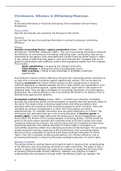Samenvatting
Summary Research in Accounting and Control - Articles
This is an English, 13-page summary of the articles that you have to study for the exam of Research in Accounting and Control. I attended all lectures and summarized the most important points for each article. The summary contains everything you need to know for the exam about the six articles. For...
[Meer zien]




